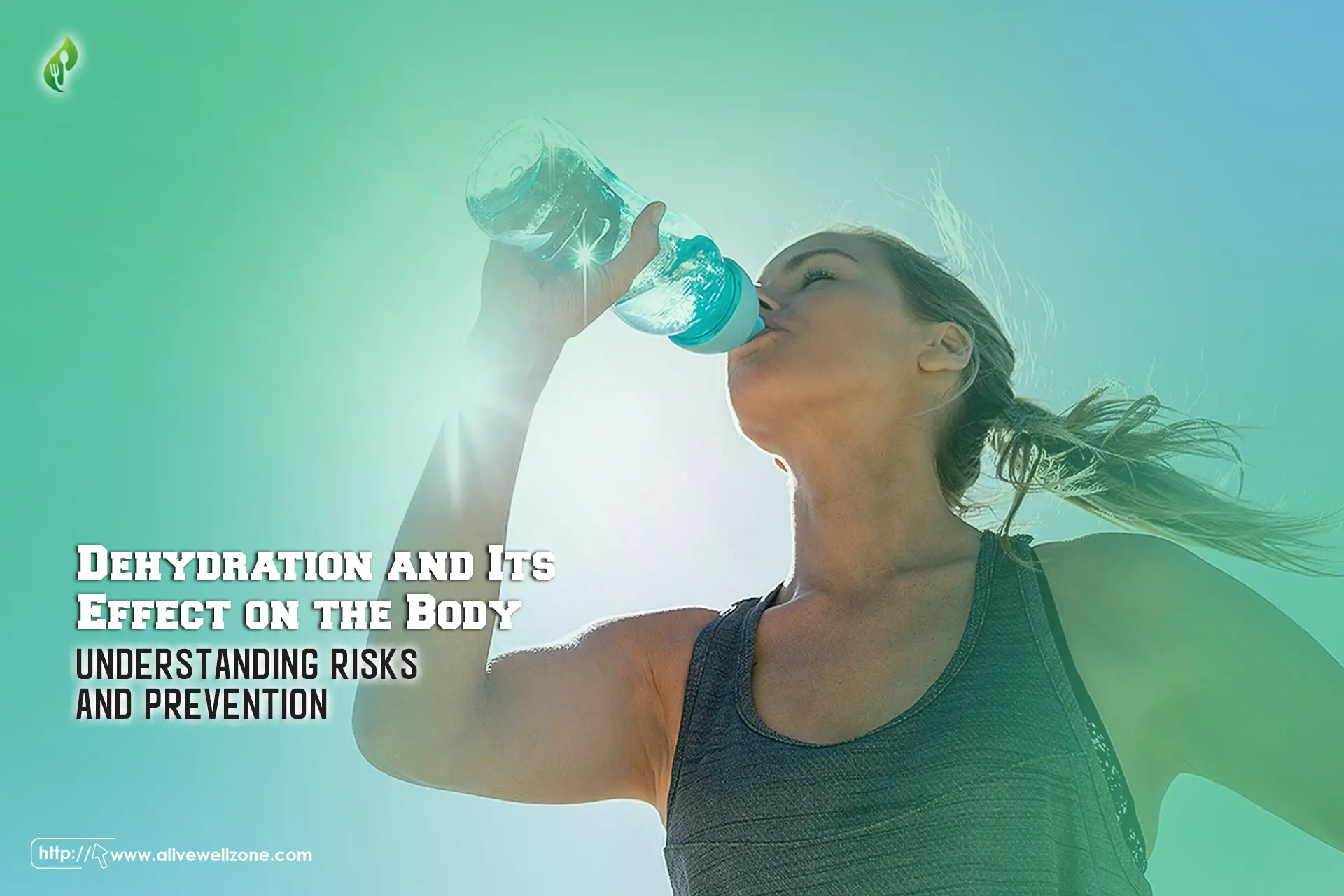
Last Updated on December 3, 2024 by Helena Akter
Ever felt a sudden headache, or dizziness on a hot summer day or experienced fatigue after a long workout? These could be signs of dehydration and its effect on the body.
The effects of dehydration could be a weakened immune system, increased risk of obesity, cardiovascular disease, and accelerated aging. It occurs due to insufficient water intake, vomiting, diarrhea, excessive sweating, or frequent urination.
Today, we’ll talk about the causes, symptoms, and effects of dehydration. More importantly, you’ll learn practical tips to stay hydrated and maintain your body’s balance. Let’s get you healthy together.
What is Dehydration?
Dehydration happens when your body loses more water than you drink. Besides, our bodies are roughly 55 to 60% water. So, when we don’t replace the water we lose, our bodies can’t function as they normally would. It leads to dehydration. If you ignore the need to drink water, dehydration will kick in.
You can quickly fix mild or moderate dehydration by drinking water or other fluids. However, severe dehydration is serious and requires medical help. What does dehydration feel like?
We all know the feeling of a dry mouth and tongue, but dehydration has more signs we need to watch out for, and these can vary by age.
What Causes Dehydration?
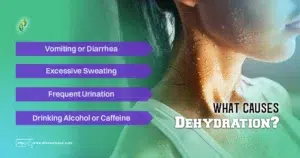
Busy lives often make us overlook drinking enough water. While we might grab coffee or sodas at work, they don’t provide our bodies with the hydration they need to function well.
In some places, not having clean water available is a major cause of dehydration. If you’re travelling, hiking, or camping where water is scarce, you might find yourself getting dehydrated.
Moreover, a high fever can speed up dehydration. But that’s not all. Other common causes include —
Vomiting or Diarrhea
Sudden vomiting or diarrhea can quickly deplete your body of water, essential electrolytes like sodium, potassium, and chloride, and minerals. It can happen way faster than you might think, leaving you dehydrated.
Excessive Sweating
Whether from intense exercise or extreme heat, sweating a lot means losing a lot of water. The harder your workout or the hotter and more humid the environment, the more you’ll sweat.
Frequent Urination
Certain medicines, especially those for blood pressure or diuretics, can make you pee more often. Also, conditions like diabetes, if not managed well, can lead to frequent urination.
Drinking Alcohol or Caffeine
Drinking lots of alcohol or caffeine can lead to losing more fluids, especially if you’re not drinking enough water to compensate.
Symptoms of Dehydration in Infants & Toddlers
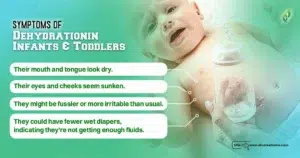
When it comes to young children and infants, spotting dehydration can be trickier. They can’t tell us they’re thirsty. So, here are clues that a young child or infant might be dehydrated —
- Their mouth and tongue look dry.
- Their eyes and cheeks seem sunken.
- They might be fussier or more irritable than usual.
- They could have fewer wet diapers, indicating they’re not getting enough fluids.
Plus, you should also learn how to get your kids to eat healthy food along with keeping them dehydrated. However, for both kids and adults, understanding these signs is key. If you or someone you care for shows these symptoms, increase water intake to avoid dehydration and its effect on the body.
Symptoms of Dehydration in Adults
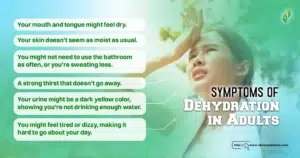
Let’s talk about how to spot symptoms of dehydration in adults and why staying hydrated is so crucial for your health. When adults don’t drink enough water, especially during hot weather or when sick with diseases that cause dehydration in adults.
In that case, they might start to feel some of these signs:
- Your mouth and tongue might feel dry.
- Your skin doesn’t seem as moist as usual.
- You might not need to use the bathroom as often, or you’re sweating less.
- A strong thirst that doesn’t go away.
- Your urine might be a dark yellow color, showing you’re not drinking enough water.
- You might feel tired or dizzy, making it hard to go about your day.
What Does Mild Dehydration Do to Your Body?
Mild dehydration occurs when your body loses 1 to 2% of its water. This might not sound like much, but it can mess with your ability to think clearly. For someone who weighs 150 lbs, this means losing about 1½-3 lbs of water, which can easily happen through everyday activities.
You might not drink enough water, or you could lose water quickly if you sweat a lot, vomit, or have diarrhea. Remember, while we can survive for quite some time without food, water is a different story, especially when it’s hot.
Symptoms of Mild Dehydration
- Your mouth feels dry.
- You’re thirsty.
- You feel tired.
- You might have a headache.
- You feel dizzy.
How to Fix It
If you’re mildly dehydrated, you can usually take care of it by drinking water or sports drinks that have electrolytes. However, stay away from alcohol and drinks with caffeine like tea, soda, and coffee, as they can make dehydration worse.
What Does Moderate Dehydration Do to Your Body?
As you keep losing water without replacing it, you reach a stage called moderate dehydration. This can happen quickly, especially if you’re sweating a lot. At this point, your kidneys, which filter waste from your blood and urine, start to save as much water as they can.
Because of this, you don’t pee as much, and when you do, it’s usually darker since there’s less water to dilute the waste.
Symptoms of Moderate Dehydration
- You don’t feel like peeing much.
- Your pee is a dark yellow.
- You might feel hotter.
- Your heart might beat faster.
- Oddly enough, even though you need water, you might feel sick to your stomach and even throw up because of the waste buildup in your body.
How to Fix It
The way to fix moderate dehydration is similar to mild: you need to rehydrate by drinking fluids. But it’s important to stop whatever activity you’re doing first. Give yourself a chance to rest and cool off. When you drink, do it slowly.
Because gulping down too much water too quickly can overwhelm your body and make you sick. By the way, you can also dehydrate with fizzy juice which helps you lose weight.
What Does Severe Dehydration Do to Your Body?
When you’re severely dehydrated, your body starts to have serious trouble. If you’re without enough water for more than a day, or sooner if you’re sweating a lot, you enter this dangerous stage. Your kidneys, brain, liver, and eventually your heart can begin to fail.
Without enough water, your kidneys can’t filter blood properly. This can cause kidney problems or even failure. Dangerous levels of toxins can build up in your blood, which in the worst cases, might lead to your heart stopping.
Symptoms of Severe Dehydration
- Very dark or no urine
- Not being able to sweat
- Feeling dizzy or lightheaded
- Passing out
- Feeling confused
- Being irritable or anxious
- Not responding to others
How to Fix It
If you can drink and have access to water or other fluids, start rehydrating immediately. However, if you’re so dehydrated that you feel sick or can’t drink, you need to get medical help right away.
Remember, severe dehydration is an emergency. To prevent dehydration and its effect on the body, call emergency help if you see any of these symptoms. You might need fluids given directly into your veins (IV fluids).
What Dehydration Does to Body?
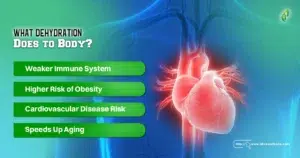
The consequences of dehydration on the body are —
Weaker Immune System
Without enough water, it becomes harder to remove harmful toxins and waste, making you more likely to get sick. Also, when you don’t drink enough water, you might have less energy and be less active, which can further weaken your immune system.
However, some foods can boost your immune system and fight off infections ensuring you drink enough water.
Higher Risk of Obesity
Not drinking enough water can slow down your metabolism. Your body struggles to get rid of toxins, so it stores them in fat cells. These fat cells won’t release their stored fat until your body has enough water to safely remove the toxins.
A simple tip to help with this is to drink two 8-ounce glasses of water before each main meal — breakfast, lunch, and dinner. It can improve your metabolism, help you feel less hungry, and support your overall health.
Cardiovascular Disease Risk
Not drinking enough water makes your blood thicker, which can slow down how fast it flows through your body. It can cause your blood pressure to go up and your cholesterol levels to increase as well. And your body does this to try to keep water inside your cells.
The American Heart Association says that having high blood pressure and cholesterol can lead to heart disease.
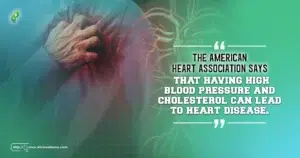
Speeds Up Aging
If you don’t drink enough water often, you might start to see more wrinkles. When you’re dehydrated, not only do you feel it, but your skin shows it too. Your skin, which is your body’s largest organ, needs water to stay full, stretchy, and bounce back from stretching.
It’s normally made up of about 30% water, which helps keep it looking healthy. But, if you’re dehydrated, that percentage can fall to below 10%, affecting the collagen in your skin. Collagen is what keeps your skin firm, so with less of it, you might notice signs of aging sooner.
How Much Water Do You Need?
To minimize dehydration and its effect on the body, you must drink water whenever you feel thirsty and have drinks handy during activities. It’s also vital to look out for those who might need extra reminders to drink water.
Many people talk about drinking eight cups of water a day, but that rule doesn’t fit everyone. The amount of water you need varies depending on how active you are, your size, and if you’re pregnant or breastfeeding. The best approach is to drink water regularly throughout the day and pay attention to your thirst signals.
Before you exercise or spend a long time in hot weather, make sure to drink water ahead of time and take enough with you. Remember to check on kids and the elderly too, as they might not always remember to drink water.
However, children might not tell you when they’re thirsty, and older adults might not feel thirsty even when their body needs fluids.
How to Keep Yourself Hydrated
Staying hydrated is crucial because it helps your body do important things like breathe, sweat, digest food, and keep your blood pressure and brain working right.
Here’s how you can make sure you’re drinking enough water —
- Drink water about 30 minutes before and after you eat.
- Have a glass of water right when you wake up and before you go to bed.
- “Eat” your water by enjoying plenty of fruits and veggies, which are full of water.
- Experiment with different temperatures, like cold or hot tea.
- Make your water more interesting by adding fruit slices (like orange, lemon, or grapefruit), herbs (such as mint or ginger), or even cucumber.
- Always carry a water bottle with you, whether you’re at work, hiking, or just out for a stroll.
- Keep a glass of water within reach at all times.
- Make sure to drink before, during, and after you exercise.
- Divide your water intake into manageable amounts for the day.
- Keep track of how much water you drink each day.
When Should You Reach Out to a Healthcare Provider?
If you experience any of the following, it’s time to call your healthcare provider:
- If you can’t stop vomiting.
- If you have diarrhea more than five times in one day.
- If you notice a little bit of blood in your vomit.
- If there’s a small amount of blood (it might look red or black) or mucus in your diarrhea.
- If your belly feels swollen.
- If you’re having belly pain.
- If you have a fever of 100.4°F (38°C) or higher, or if your healthcare provider has given you other instructions about when to call.
Conclusion
Dehydration and its effect on the body can lead to impaired immune function, increased risk of disease, and accelerated aging. So, you must understand its causes, such as vomiting, excessive sweating, and not drinking enough water.
However, symptoms vary from dry mouth to severe dizziness, requiring different levels of attention. To stay hydrated, drink adequate water daily and listen to your body’s needs.
For severe dehydration, seek medical help promptly. Remember, staying alert to the signs of dehydration and taking necessary precautions is key. Approach hydration in an organized manner without feeling overwhelmed. Besides, simple steps can significantly impact your health and well-being.
FAQs
What is the quickest way to rehydrate your body?
Drinking water is the fastest way to rehydrate. Oral rehydration solutions are great too because they have important electrolytes. These are especially helpful if you’re dehydrated from being sick with vomiting or diarrhea, or after working out hard.
When should you go to the ER for dehydration?
Go to the emergency room if someone shows signs of severe dehydration, especially after being in the heat or having a high fever. A body temperature of 104°F (40°C) or higher can cause brain damage or be life-threatening.
What not to eat when you are dehydrated?
Stay away from caffeine, alcohol, sodas, and sugary drinks as they can make dehydration worse. If you have kidney problems, talk to a doctor about what you should eat and drink, as your electrolytes and nutrients may need to be monitored.
Is it OK to sleep when you are dehydrated?
Being dehydrated can mess with your sleep. So, stay hydrated by drinking water, eating foods that promote hydration, and avoiding things that cause dehydration. To avoid waking up at night to go to the bathroom, just have a small drink of water before bed.
what organs are affected by dehydration?
Dehydration can lead to shock, which means blood pressure can drop too low. This is really bad for your liver, kidneys, and brain. Brain cells, in particular, are very vulnerable if you’re severely dehydrated.







